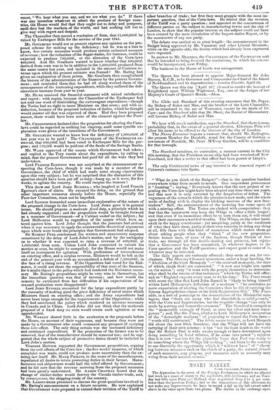"What do you think of the Budget ?"—that is the
question bandied everywhere today from mouth to mouth. One respondent pronounces it " humbug " ; saying," Everybody knows that the new project of re- pealing the Corn-law might have been adopted any time these ten years, and that now it is only extorted by the desperation of defeat The vagueness of the terms in which the promise is now made, and the whole mode of dealing with it, display the tricking motives of the new free- traders." Still, the announcement of the morning has come upon all with a stirring effect. The Tories are choked with exasperation : they fear that the manceuvre may keep the Whigs in office a little longer ; and that even if its immediate effect be to turn them out, it will entail upon their successors a world of trouble. The Whigs, on the other hand, exult in the happy contrivance : yet misgiving, partly at the smallness of what they have done, partly at their own temerity in doing any thing at all, fills them with that kind of uneasiness which makes them go about asking people what they " think " of the new proposition. Sedate honest men, of none of the factions, though friends of free trade, see through all this double-dealing and pretence, but rejoice that a Government has been committed, in whatever degree, to the Corn question and the Tariff question ; and expect good to come of it, whatever may be intended.
The daily papers are variously affected : they seem at sea for con- clusions. The Morning Chronicle announces, under a huge heading, the "Abolition of the Corn Monopoly "—" the accursed monopoly, the days of which, thank God ! are numbered." "A new and bright sera opens on the nation "; only "it rests with the people themselves to determine what shall be the results of that resistance" which the Tories will offer; and so "England expects every man to do his duty." The Times treats with scorn the idea that Lord John Russell is "likely to bring himself within Lord Melbourne's definition of a madman ": "he entertains no more expectation of altering the Corn-laws than he did of carrying the famous Appropriation-clause or the Irish Registration Bill." The Times adds, in a sort of postscript to the denunciation of the Ministerial stra- tagem, that "there are many who feel dissatisfied, on solid grounds," with the Corn and Import duties, but the requisite change" can only be made by a strong and honest Government." The Standard is enraged at the "memorable example of fraud, at once the vilest and most trans- parent " ; and, like the Times, alludes to Lord Melbourne's declaration of the "downright madness" of proposing to repeal the Corn-laws- " words still unretracted." The Globe seems to think, as Lord Morpeth did about the new Irish franchise, that the Whigs will not have the carrying of their own scheme : it has not the least doubt in the world that Sir Robert Peel is wide awake enough to have determined upon doing something in fiscal reforms, if be came into power " ; rejoices that it is now "too late for the plausible boast that Peel was ready to do something where the Whigs did nothing " ; and hints to the country to use discreetly the opportunity which it "will now have" of " choos- ing between measures such as the chiefs of a party, the natural friends of such measures, may propose, and measures such as necessity may wring from their natural enemies."


























 Previous page
Previous page